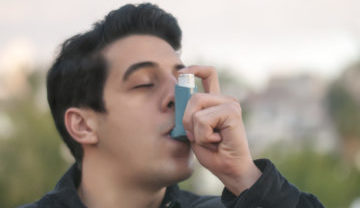Living Well with Asthma
If you have asthma, you’re not alone. Nearly 7 million children and teenagers have this chronic condition. Nobody likes wheezing, coughing or feeling short of breath, but knowing your triggers and having an action plan will help you stay safe and healthy while living your life to the fullest!
Asthma and Teens
As you get older, you’ll naturally start becoming more independent. This means that you might be responsible for remembering medications and avoiding triggers for the first time. You might also start to worry about how asthma will affect your social life: what will my friends think if I use my inhaler right now? Will I miss out on a fun time if I leave my friend’s house early, even though their cat is causing a flare-up? Having new emotions or questions about your asthma is normal. But it’s important to not let insecurities or doubts get in the way of taking care of your health.
Your asthma symptoms may start to cause more problems after puberty. This could be caused by hormonal changes or by changes in behavior like:
- Not taking your medicine.
- Encountering asthma triggers like allergies, a cold or the flu, extreme hot or cold weather, or pests like cockroaches when you can’t easily get away from them.
- Smoking or being around smokers.
- Exercise. Being active is important to your health. You should be able to play sports if you want, but it’s important to have an action plan to control your symptoms.
Avoid Triggers
One of the best moves you can make is to avoid things that trigger your asthma and cause flare-ups. Here are some common triggers and how to avoid them:
- Pets: If you’re allergic to a pet, don’t let it sleep with you, and keep it out of your bedroom. Keep your room free of dust and clean it really well, often. You may need to start taking allergy medicine or getting allergy shots in addition to your asthma medicine.
- Smoking: If you smoke—this includes marijuana–it’s very important to stop. Your doctor can help you quit. Ask your friends and family not to smoke around you or to quit smoking. Quitting will be good for their health and yours!
- Pollution: If there are high levels of air pollution, stay indoors and don’t exercise outdoors.
- Pollen: Pollen levels are highest in the spring and fall. If you have noticed more asthma symptoms during those seasons, you may be allergic to some type of pollen. Use air conditioning if you have it, because it filters the air and reduces humidity in your room or house. If you do have allergies, ask your doctor if you need an epi pen. If you do, be sure to carry it with you to school.
- Weather: Cold, dry air or high heat and humidity are triggers for some people. Wet weather can cause mold to grow, which can cause allergies. Be aware of the weather before you go outside. Do what you can to avoid pollen and mold. Wear a scarf over your nose and mouth when the weather is very cold.
- Exercise: You don’t have to quit sports or being active just because you have asthma. In fact, world famous soccer player David Beckham, track and field legend Jackie Joyner-Kersee and many other professional athletes have asthma! Work with your health care provider to develop an asthma action plan. This plan will help you handle your symptoms so you can stay safe while exercising.
More Tips
- Get a flu shot: People with asthma are more likely to have severe complications from the flu. This is because people with asthma have swollen and sensitive airways. The flu can make this inflammation worse. You can reduce your chances of catching the flu by getting vaccinated every year. Talk to your health care provider about making a flu shot part of your annual care.
- Avoid alcohol: Not everyone with asthma is affected by drinking alcohol, but in one study, 33 percent of participants said alcohol triggered a flare-up at least two times. Beer, hard ciders, and wines have sulfites and histamines in them, which can trigger allergic reactions in some people.
Take Your Meds
Medication is one of the most important ways you can control your asthma symptoms. Your doctor will evaluate your symptoms, take your complete health history, perform a physical exam and run tests to determine which medicines you need. Medications fall into two groups:
- Daily long-term control medications: These are maintenance medications which you need to take every day to reduce your symptoms over time—even if you are feeling your best!
- Quick-relief medicines: Also called rescue medicines, these work fast to stop wheezing, coughing and shortness of breath. Most are inhaled. They act fast, but they wear off fast.
Taking the right medicine at the right time is key to avoiding flare-ups and feeling well.
Remember to take your medications and to carry your inhaler with you every day! You can set a reminder on your phone to help you remember. Keep a copy of your asthma action plan in your backpack, and make sure your school nurse or other health care provider has a copy, too. At every health care visit, make sure to review your asthma action plan with your doctor.
Get Help in an Emergency
Even if you stick to your asthma action plan and are good about taking your medicines, you may still have flare-ups sometimes. If you have symptoms in the Red Zone of your plan, get help right away. Don’t feel embarrassed to go to the emergency room if:
- You take your asthma medicine and you don’t get better.
- Although you feel a little better, your symptoms then come back quickly.
- You are wheezing or coughing a lot, or have chest pain.
- Your lips and fingernails are bluish or grayish.
- You have trouble breathing, talking, or walking.
Most flare-ups will go away fast when you take the medicines your doctor recommends, and you won’t have to go to the ER. But don’t hesitate if you feel you need to go. You know your body best.
If you are 10-22 years old and live in the New York City area, you can come to Mount Sinai Adolescent Health Center to see a doctor and learn to manage your asthma, even if you don’t have health insurance. Our care is free and confidential. Give us a call to make an appointment.
This information is not intended to provide medical advice, professional diagnosis, opinion, treatment or services, only general information for education purposes only.


